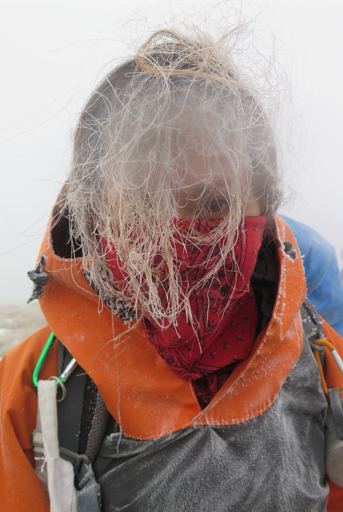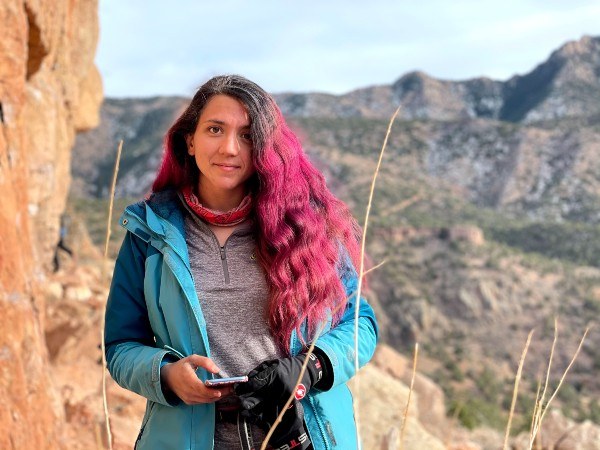
Meryl Lassen (she/they) is a 7-year member, Super Volunteer, and member of our Equity & Inclusion Working Group. She has written about her personal journey to find belonging in the outdoors, and she’s an outspoken supporter of The Mountaineers efforts to create a community where all people feel belonging.
Meryl met Kiana Ehsani (she/her) on an Intermediate Glacier Travel Field Trip to the Lower Nisqually in March 2021, and immediately started building community together. Kiana is an experienced climber from Iran, having reached the summit high mountains in the Alborz range, including of 18,406 ft. Damavand. Kiana moved to Seattle in 2016 to pursue her PhD in coder science and, despite her wealth of climbing experience, it took her a while to find her footing in The Mountaineers. For this article, we asked Meryl to sit down with Kiana to understand Kiana’s journey and share lessons to uplift future leaders in our organization.
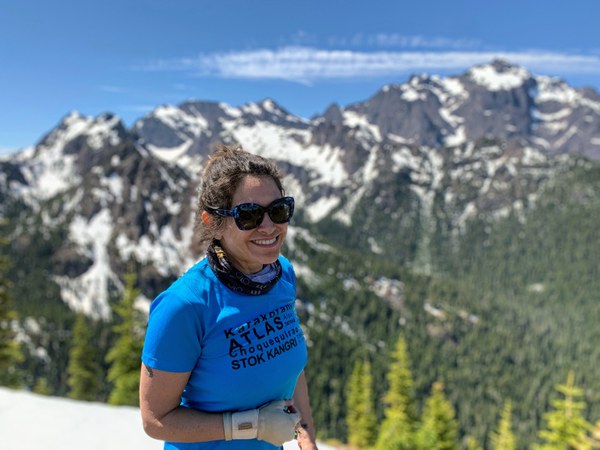
Meryl Lassen on the summit of Valhalla Peak while leading a Mountaineers scramble. Photo by Kiana Eshani.
Meryl: How did you get started outdoors?
Kiana: Back in the college in Iran, I joined the student climbing club. I think at first I was joining more for the social connections, but after I went on a couple of trips, I realized that there were more aspects of the club that were attractive to me. I started having a love for nature and mountains. The climbing club was community-based. We had trips with groups of 30-40 people. We had just one person in charge of deciding food for everyone – they would decide every single snack and food that everybody's going to eat. We were having many new members in each of our trips, and it was better for someone who's more experienced to make sure the new people were getting enough nutrition. So that one person would decide what are the snacks and what are the main foods meals, and make a shopping list and then distribute the shopping among all the participants. On the day of the trip, another person was in charge of distributing the weight. Even though this is not the standard way, it brought this sense of community. You're experiencing the same thing altogether.
Kiana in the cold on Taftan peak (12,930 ft), Iran. Photo courtesy of Kiana Eshani.
The trips were also cultural. We had one person in charge of the cultural events. We would have discussions every night at camp about different topics: economical topics, political topics, you know, everything. That’s why it felt like those friends are friends for life. That resulted in very close relationships.
It's been six years since I graduated from college and moved to the U.S., and still the closest friends I have are either friends from back in that club or friends who I knew through friends in that group. When you meet someone in the mountains, it's different. You see them through their hardest days, and you might see them through critical, dangerous moments. It's something that you can't replace with any simple trip or just going to a bar and having fun. I'm not saying those things are bad. It’s just a very different experience.
Is that what you were looking for when you came to The Mountaineers?
I wanted to have the same experience here. I wanted those close connections. That's why I tried to join The Mountaineers a few months after I had come to Seattle in 2016. But I couldn't find what I was looking for. I tried to join some trips, but then realized that, oh, there are a lot of badges that I need to get. I have had many experiences and I've taken many courses before, so it didn’t make sense for me to take the courses again. Trips were filling up so fast and I didn’t have a car. And it was a bit expensive for a student. With all these complications, I stopped trying for a while.
I made other friends, but it wasn’t right either. For most of my friends outside The Mountaineers, climbing is a side hobby. They're not passionate about it, and most of the time they want to do mountains just so that they can check it off their list. For me, I actually get upset when people think about mountains like that. I feel like it’s just a matter of being in the mountains and enjoying the nature. Most of the people I’ve met through The Mountaineers have that mindset. They don't actually care that much about what climb they do, it's more about being outside in nature as much as possible every weekend and just appreciating it and being safe.
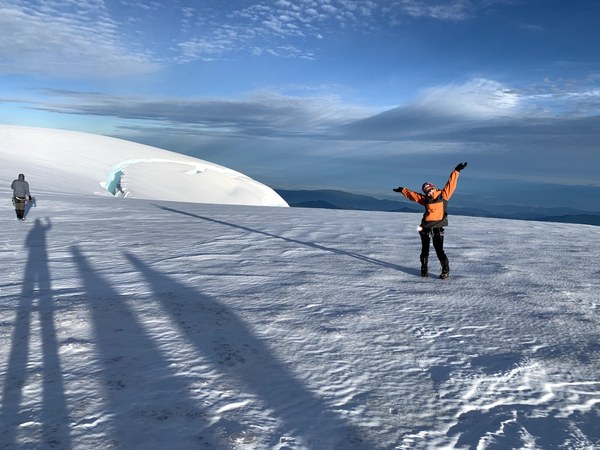 Kiana near the summit of Mt. Baker, WA. Photo by Hamed Mortazavi.
Kiana near the summit of Mt. Baker, WA. Photo by Hamed Mortazavi.
Tell me about your progression of feeling included and feeling integrated and becoming a part of this community, because I know it was a process for you and it took a couple of years.
My turning point was last year Intermediate Glacier Course. The environment of the trip helped me realize that oh, maybe The Mountaineers is offering what I was thinking. It was my when I realized that Jerry [Logan, the course leader] cared about me. And you too Meryl. Jerry asked you to split a snow cave with me before we even meet so that I don't feel left out.
I always felt like you guys are humble, but at the same time you don't look at me as if, ‘I am from Middle East. I don't have that much experience.’ I had experience, but it was really different from here. You both put effort on making sure that I feel comfortable and included. He asked people to get dinner together and they started boiling water for everyone. It was amazing. I felt like, ‘oh, this is exactly what I wanted.’
I can't say I didn't feel welcome before, but it felt like The Mountaineers is a club that I had to try really, really hard to get into. I felt like I had to prove myself from the beginning and all from scratch.
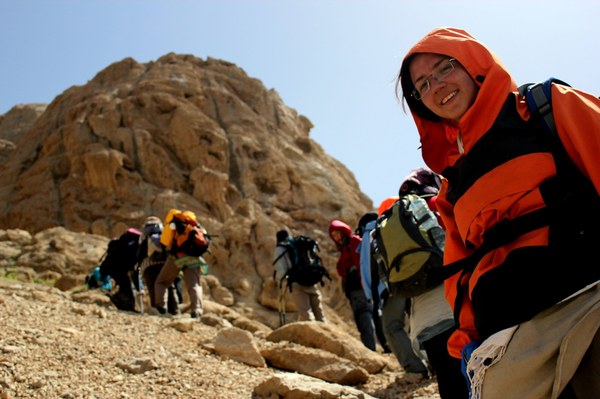 The student climbing club on Mount Paraw (11,120 ft), Iran. Photo by Nina Maziar.
The student climbing club on Mount Paraw (11,120 ft), Iran. Photo by Nina Maziar.
It sounds like you’re talking about imposter syndrome, and I’ve experienced that too. I think some imposter syndrome comes from us internally and I think some comes from the culture. I believe it's one of the biggest barriers to retention, to success, and to people feeling comfortable in The Mountaineers. What do you think we each could do to make that go away?
The things that have helped me is hearing people talk about when they were struggling or were unsure. If I had verbalized the fears that I had in my mind, people will have the opportunity to say, ‘this is normal. This is not just you. It happens to everyone. It happens to all of us.’
I think that having my culture and my identity and my skin color and my accent is something that is always on my shoulder. I am always worried that if I do anything wrong, people will be like, “You know, they're right about Middle-Eastern people.” As I was leaving Iran for the U.S. my mom told me, “Always show your good self because the media is showing a wrong side of us. That’s one of your goals to show that on the other side of the world, there are real people just like you, experiencing hardship.”
That’s a lot of pressure. It’s a burden on your shoulders of having to represent your entire people. And I just don't think there's any one way to enjoy the outdoors. Culture does play a part in how we enjoy the outdoors and the outdoors can also be an extension of our culture and our families and the way we were brought up, and that needs to be honored too.
With that in mind, what are some myths you’d like to bust?
The main important one is that we do have mountains in Iran. Mountaineering is getting more and more popular every day.
Women do climb. I think the misconception about Middle Eastern girls and women in general is that our society, our culture expects you to not go out and stay home. But it's actually the opposite because we are warriors. We had to fight for our basic rights for things like education, and what to wear, or how to go into the mountains. In college our climbing club trips were gender separated. But even so women do not wear hijab all the time. We don't wear burkas. And we definitely do not wear that on the mountain.
Another one is that not all Iranians are Muslim, and especially these days, people are okay with eating pork and drinking alcohol. I'm vegetarian because I want to be vegetarian, not because I have to. It sometimes bothers me when people assume otherwise.
I think that I always feel that people have some judgements about me from the beginning and that's why I don't wait for people to ask me where I'm from. It's the first thing I say in all the introductions that I do in The Mountaineers. I say, “I'm originally from Iran, moved here six years ago.” I say this so people know that I'm not ashamed and that I'm okay to talk about it. But I am a little bit insecure about how I'm perceived.
Do you get angry or upset when people assume that you were repressed?
Do I get angry? I don't, I know some people that do though, so I can only answer on behalf of myself. I actually love to talk about Iran and let people know how things work. If there is any misconception, I would love to resolve that, but I know that for some people they just want to be a normal person and leave that baggage at home and just enjoy the mountain. I think in general, if you do have questions first ask if it’s okay to ask them, and be okay if someone says no. And try not to make assumptions.
I love that. The idea that we should be meeting people and meeting moments with openness and curiosity versus implicit bias. This is true for brown people and women in particular. It’s important for all of us to keep this in mind. Don't assume that the person is going to be slow because they're old, or that the person's going to be fast because they're young or because you perceive them to be fit. The biases that we have show up everyday.
It's the same at my work in tech industry, but I think that people can change. Even though the process might look slow, it's going to happen. Meryl you played an important role by trying to get me involved in the conversations on that [Intermediate] trip. You just started asking about my background and embracing it for the first time. You made me feel like, ‘oh, I have done some things.’ You made me feel like it's not that I haven't done anything and these guys are perfect and there's no way for me to get inside the group. I think that was a big change for me.
Where do you hope to see The Mountaineers go from here?
I emailed Krishna “KD” Dase [Super Volunteer] a couple of months ago saying I want to join his Shuksan trip. And he said, “Sure, but I just looked at your profile and I saw you are an intermediate student. I'm teaching a course and I have a female participant, but it's only her. I would love to have a female leader on the course. Can you help with that?” And I had other plans for that weekend, but I canceled it. And I was like, yes, I am in! This is amazing that you actually care about this.
I think this was something that I'm sure not only affected that participant on that trip, but also me as the person who saw that he cares. So now whenever he asks me to do something or help out, I'll be in. I feel more positive about the community overall. Now I don't think of myself as someone that is an outsider anymore. I'm invested enough that I want to fight for it and put effort into it. I'm willing to do that. Cause if there's anything I can do to help this club, I'll do it. It's mine now.
Want to make your trips more welcoming and our community more accessible to all people?
Set clear expectations before a trip.
Disappointment and feelings of exclusion can often come from mismanaged expectations. Be as clear as possible with participants about things like pace, equipment, turnaround time, etc. Then, make decisions based on those criteria while you’re on the trip, doing your best to hold true to the expectations you set.
Host introductions.
Introductions are a great way to build community and belonging. Share your name, pronouns, and ask a question that will invite buy-in for the trip you have planned. Maybe ask folks what they hope to take away from the experience, or to describe their personal weather for the day (helpful in understanding group dynamics). Avoid questions like, “What’s your favorite hike?” that can exclude people who are new to hiking or new to the area.
Be mindful of your assumptions about people.
Ask questions. Be curious. Assume everyone has the best intentions and model the behavior you hope to see.
Check in frequently.
Encourage conversations about personal well-being. Make sure your participants are fed and hydrated, and that they’re feeling confident in their skills. Invite people to share questions or concerns. On longer trips, you can ask experienced participants to serve as “social leaders” to support conversations and help everyone feel belonging in the group.
Pose feedback as a question rather than a judgement.
When possible, ask questions rather than taking immediate corrective action. People learn better when they have an opportunity to problem-solve for themselves, and feel more included when they’re part of a solution.
Send individual follow up emails after the trip.
Invite past participants to join you on upcoming trips. Encourage individuals to step into leadership roles or ask them to help you with a small detail on an upcoming trip. Invite feedback and use it as a gift to continue to hone your own leadership skills.
This article originally appeared in our Fall 2021 issue of Mountaineer Magazine. To view the original article in magazine form and read more stories from our publication, visit our magazine archive.
 Kristina Ciari Tursi
Kristina Ciari Tursi
